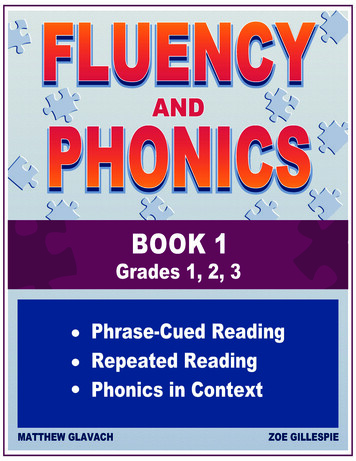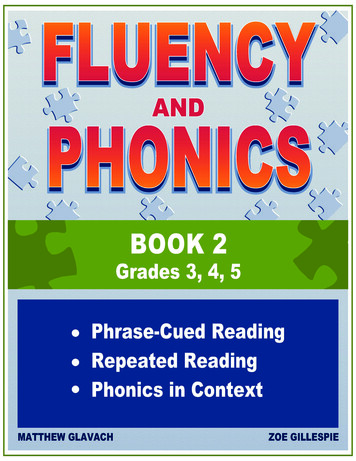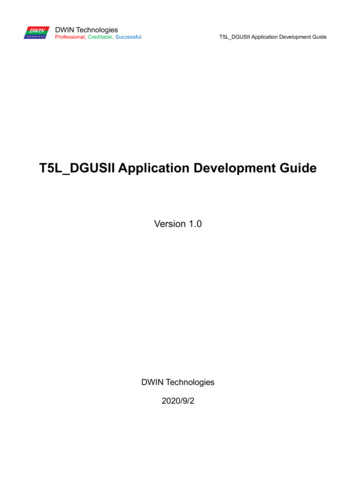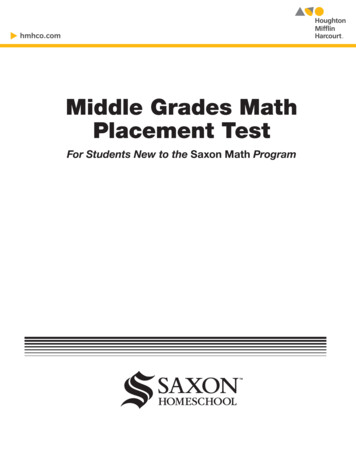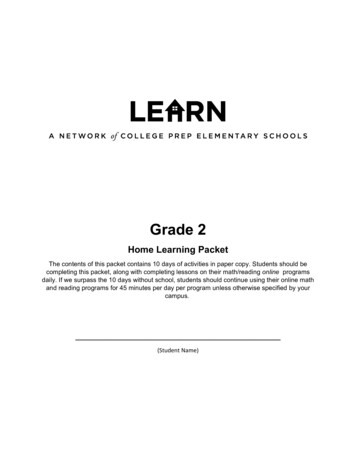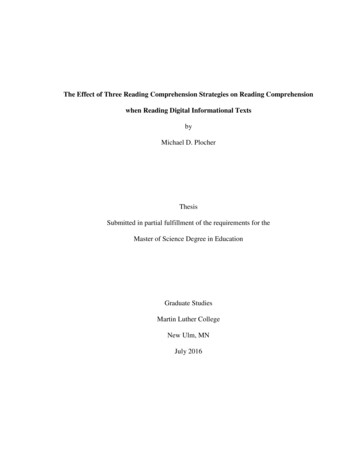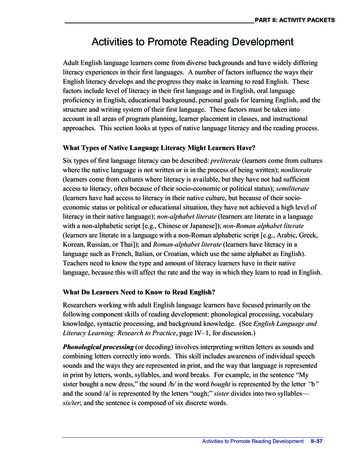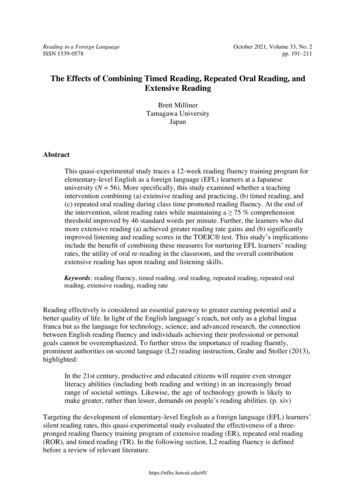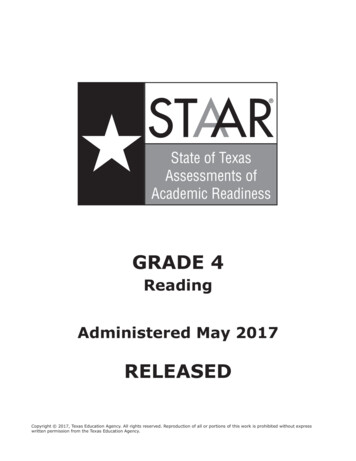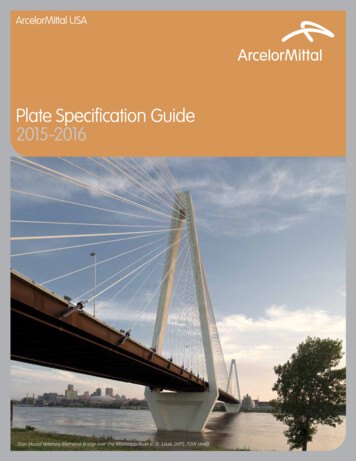
Transcription
STAAR State of TexasAssessments ofAcademic ReadinessGRADE 5ReadingAdministered April 2019RELEASEDCopyright 2019, Texas Education Agency. All rights reserved. Reproduction of all or portions of this work is prohibited without expresswritten permission from the Texas Education Agency.
READINGReadingPage 3
Read the selection and choose the best answer to each question.Then fill in the answer on your answer document.The narrator no longer wants to share a room with his younger brother.fromPlaying the Fieldby Janette Rallison1At home I continued to be a model son in order to persuade myparents I did, indeed, need a room of my own. That night after dinnerwhile I cleared off the table and Mom put things in the dishwasher, Iasked her, “Did you and Dad talk about moving Kirk out of my room?”2“Well, we talked about moving you into the office.”3“Me? Why do I have to be the one to move?”4“Because you’re the one who wants his own room.”5“But Kirk’s the one that’s impossible to live with.”6Mom handed me a dishcloth. “Kirk’s been in that room since he wasa baby. It will be easier on him to be alone if he’s still in familiarsurroundings.”7“But all the stuff in that room is mine. It’s decorated with posters ofmy favorite baseball players.”8“I know it’s not exactly fair,” Mom said, “but if you want your ownroom, you’ll have to make some concessions.”9I knew she meant I had to let Kirk have his own way.10“But don’t you think Kirk would like to decorate a room withsomething he likes?” I asked. “Something with cowboys or astronauts ortrains?”11Mom poured the dish soap into its tray. “Kirk does like trains,” shesaid. As she wiped off the counters, she called, “Kirk!” A few momentslater he trotted in.12Mom put on the overly happy face she always uses to try to get Kirkexcited about something. “Hey, sweetheart, I was just thinking abouthow much you like trains. Maybe you’d like to spend more time withsome trains.”13ReadingPage 4“Are we going someplace?” Kirk asked hopefully.
14“Well, no. I was just thinking maybe we could decorate the officewith train things. Would you like that?”15“Yeah,” Kirk said slowly, as though he knew there was a catch butwasn’t sure where.16“Wouldn’t it be fun to move your bed in with all of the train things?”17“No!” His face scrunched up, and he put his hands on his hips. “I’mnot moving to the office. I want to sleep in my baseball room.” Hestomped off.18She sighed. “We’ll give him a little time to adjust to the idea.”19I figured he could adjust while I moved his things out, but I didn’tsay so. I was being a model child.20On Sunday I told Kirk over and over again how neat his new roomwould be. It didn’t matter. Kirk refused to adjust. He wanted his closet,his window, and his posters, which unfortunately also happened to be mycloset, my window, and my posters.21Mom and Dad said they’d try to reason with Kirk about it. Sincewhen has reason solved anything in the world?2223242526That night I tried my own methods to convince Kirk to move.“Kirk,” I said, “I haven’t told you this before, but there’s buriedtreasure somewhere in the office.”Kirk surveyed me skeptically. “What kind of treasure?”“Gold and silver,” I whispered in awed tones, but when he didn’t lookimpressed, I added, “And Hot Wheels, and flashlights, and swords. If youmove into the office, I bet you’ll be able to find it.”“How come Mom and Dad have never told me about the treasure?”27“They don’t know about it. It was left there by the people whoowned the house before we did.” I continued slowly, “I discovered a mapfor the treasure. I was going to find it myself, but if you agree to moveto the office, I’ll give you the map.”28Kirk pulled on the top to his pajamas carefully. I knew he wasthinking it over.29“And I’ll tell you another secret.” I looked under the bed quickly as Isaid this. “I’ve also discovered a bunch of monsters have moved into thisroom. I think I’d better stay here and fight them off so they don’t eatanyone.”ReadingPage 5
3031I flung the closet door open quickly and jabbed my hand into theclothes a few times.Kirk said, “You’re just trying to scare me so I’ll move out.”32I put my arm against the back wall of the closet and acted like I wasbeing sucked in. “Oh, no!” I yelled. “One’s got me now!”33Kirk let out a scream and ran down the hallway to our parents’room.34After a few minutes, Dad came into the room holding Kirk’s handand gave me a stern lecture about putting ideas into my brother’s head.I don’t know what Dad was worried about. If I could really put ideas inKirk’s head, the idea that he should move into the office would havestuck.From Playing the Field by Janette Rallison.ReadingPage 6
1 What does the interaction between Mom and the boys show about her?A Mom is eager to help the narrator with his request.B Mom tries to consider everyone’s feelings when making decisions.C Mom is angry that she has to give up her office for the narrator.D Mom expects her children to act perfectly at all times.2 In paragraph 8, the word concessions refers to something that is —F created by accidentG decided without much thoughtH kept in a special areaJdone in order to come to an agreement3 What is the best summary of paragraphs 1 through 19 of the story?A The narrator helps clean the table because he wants his own room. He is upset tohear that he will have to be the one to change rooms. He suggests that hisbrother would like a new room with his own decorations. He reminds his motherthat Kirk really enjoys trains.B The narrator asks his mother if she and his father talked about moving Kirk into adifferent room. The mother considers that Kirk might like to decorate a new room.She mentions trains to Kirk. Kirk becomes excited and thinks they are goingsomewhere with trains.C The narrator thinks of a plan that will make his brother happy and allow themboth to have their own rooms. His mother says that Kirk should stay in the roomhe is currently in. She explains that he has always been in that room and wouldbe more comfortable there.D The narrator tries to be helpful so he can get his own room. He becomes upsetwhen his mother says that he will have to move into the office. He tells his motherthat Kirk would enjoy the new room. She talks to Kirk, but Kirk refuses to moveout of their current room.ReadingPage 7
4 Read this sentence from paragraph 21.Since when has reason solved anything inthe world?This sentence suggests that the narrator believes —F his parents do not understand why he wants his own roomG he is unlikely to get the outcome he wantsH his brother is too young to understand what is being asked of himJhe has the same problem as many of his friends5 Which event occurs as a result of the narrator’s conversation with Kirk?A Kirk decides he would enjoy having trains in his room.B The narrator realizes that sharing a room with Kirk is not all bad.C Kirk becomes excited about moving his bed into the office.D Dad is unhappy that the narrator tried to scare Kirk.6 How are the narrator and Kirk similar?F Both are determined to get what they want.G Both enjoy sharing stories about hidden treasures.H Both feel their parents do not understand them.JReadingPage 8Both know the best way to trick each other.
Read the next two selections. Then choose the best answer to eachquestion.Wildlife WondersIn this issue: Find out why koalas hug trees!Volume 2November 20151 There’s something about the sight offurry koala bears—they look socuddly, you just want to give them ahug. Of course, koalas don’thug . . . or do they? Recently, duringan extreme heat wave in Australia,scientists noticed something unusual.As the temperatures rose, koalashigh in the eucalyptus trees climbeddown from the treetops. Then theyspread out on lower tree limbs. Itlooked as if they were embracing thetrunks. But why would koalas hug trees?A Koala Hugging a Tree2 Scientists have studied koalas for years. They know that koalas cannotsweat. The tree-dwelling mammals have few ways to stay cool during thehottest days. They can lick themselves or pant. However, both methodscause them to dehydrate. They could leave the safety of their trees tosearch for water, but water is difficult to locate. Besides, the koalasmight run into a predator.3 The scientists decided to do some detective work. They tracked 37koalas that had been radio tagged. The tags helped the scientists locatethe koalas so they could observe the koalas more closely. First theynoted the animals’ posture and location in the trees. When the weatherwas mild, the koalas sat high up in the treetops. They ate eucalyptusleaves or curled up in balls. However, as the weather turned steamy, thekoalas climbed farther down. They pressed their bodies close to treetrunks.ReadingPage 9 iStock.com/nattanan726Keeping Cool
A thermal image shows that thiskoala’s body temperature is higherthan the temperature of the treetrunk.Used with permission.4 Next, scientists used technology to find out why the koalas behaveddifferently depending on the weather. They placed a special infraredcamera on a long pole. The camera measured the air temperaturessurrounding the animals wherever they chose to sit. Then scientists tookphotos. The camera made thermal images that showed heat. In thermalimages, darker colors show cooler temperatures. Lighter colors representhotter temperatures.5 These images verified that koalas hug trees to keep cool. They showedthat the tree trunks and lower limbs were up to nine degrees cooler thanthe surrounding air. The trees kept cool by drawing up water throughtheir roots from deep below ground.6 Koalas were using the trees to absorb their body heat. By completelyspreading out against the cooler trees, the animals could lower theirtemperatures as much as 68 percent. This allowed the koalas toconserve the water in their bodies. No wonder these cuddly creatureswanted to wrap their bodies around a tree trunk. Clearly, hugging treesoffers relief to koalas when temperatures rise.ReadingPage 10
Spongers of the Sea1 Just about everyone knows that dolphins are social, friendly creatures.But in addition to being friendly, dolphins are also smart. Recently,researchers spotted dolphins in Shark Bay, Australia, doing somethingquite clever and unusual. The dolphins were using a tool to hunt for food.2 Why would dolphins need a tool? And without hands, how would they usethe tool? The answers show just how smart these animals are.3 Dolphins need healthy food. However, the most nutritious fish often hideunder the sand on the ocean floor. Typically, dolphins can locate thesefish easily because a part of the fish’s body creates an echo that dolphinscan hear. But in Shark Bay, the bottom-dwelling fish do not have thatbody part. That means the fish are hard to find. Dolphins often cutthemselves while using their noses to search for these fish that hideunder the sand.4 Amazingly, dolphins have found a way to solve this problem using a tool.The tool is a type of sponge that is found in the ocean. Many sponges areflat, but some are shaped like cones. The bottlenose dolphins in SharkBay look for the cone-shaped sponges. When they find one, they usetheir nose, or rostrum, to break it off.A Sponging DolphinReadingPage 11 Hugh Pearson/naturepl.com5 After the sponge is detached from the seafloor, a dolphin is able to fit itover its rostrum. Researchers believe that these dolphins wear thesponges in order to protect their rostrums from injury. The jagged rocksand broken coral will not cut them as they hunt for food along the oceanfloor. Researchers call this hunting technique “sponging.”
6 Once a fish is scared out of hiding, it will dart around in the open waterbefore reburying itself in the ocean sand. This behavior gives the dolphintime to shake off the sponge and catch the fish.7 Scientists notice interesting behavior patterns among sponging dolphins.Mother dolphins are teaching their calves how to use sponges. Scientistsalso see that sponging dolphins tend to socialize with other spongingdolphins. They will continue to study dolphins in hopes of learning moreabout how dolphins think and behave.ReadingPage 12
Use “Keeping Cool” (pp. 9–10) to answer questions 7–10. Then fill in theanswers on your answer document.7 Read this information about the origin of the word verify.from Latin verus, meaning “true”This information helps the reader know that verified in paragraph 5 means —A provedB comparedC observedD suspected8 What is the best summary of the article?F Koalas are furry mammals that can be found in Australia. Over the years scientistshave learned a great deal about these tree-dwelling animals. For example,scientists know that koalas eat eucalyptus leaves and hug trees.G Scientists wondered why koalas grasp the lower trunks of eucalyptus trees whenthe temperature rises. By using technology to study koalas, scientists discoveredthat doing so allowed the koalas to conserve the water in their bodies.H Scientists used technology to observe koalas that hug trees. The scientists locatedthe animals with radio tags, took photographs of them, and measured theirtemperatures.JIt is difficult for koalas to live in hot environments because they cannot sweat.They can lick themselves or pant, but these methods can cause them to becomedehydrated.ReadingPage 13
9 Which idea is supported by information found throughout the article?A Koalas can dehydrate while trying to stay cool.B Studying koalas requires special equipment.C Searching for water is a dangerous activity for koalas.D Changes in temperature affect the behavior of koalas.10 Based on information in paragraph 4, why does the tree trunk appear dark in thethermal image?F To make the koala easier to seeG To show it absorbs heat from the koalaH To represent its cooler temperatureJTo illustrate the water inside the tree trunkReadingPage 14
Use “Spongers of the Sea” (pp. 11–12) to answer questions 11–14. Thenfill in the answers on your answer document.11 How do the bottom-dwelling fish in Shark Bay cause a problem for the dolphins?A The fish swim so quickly the dolphins are unable to catch them.B The fish are not nutritious enough to support the health of the dolphins.C The fish travel to other locations during certain times of the year.D The fish do not have a certain body part that allows the dolphins to locate them.12 The author wrote the selection most likely to —F encourage the reader to visit AustraliaG describe how dolphins use sponges as toolsH explain to the reader where dolphins find foodJidentify which ocean animals live in Shark BayReadingPage 15
13 According to the selection, how do fish protect themselves from dolphins?A They bury themselves beneath the sand along the sea floor.B They take cover under sharp rocks and pieces of coral.C They swim in a darting pattern in the open water.D They make a ringing noise that tricks dolphins.14 Which idea from the selection is illustrated by the photograph?F Bottom-dwelling fish in Shark Bay may be hard for dolphins to find.G Researchers think dolphins are more intelligent than many other animals.H Dolphins use their rostrums to help them locate food in the ocean.JShark Bay dolphins fit sponges over their rostrums before searching for fish.ReadingPage 16
Use “Keeping Cool” and “Spongers of the Sea” to answer questions 15–18.Then fill in the answers on your answer document.15 Both authors focus their selections on animal behaviors that —A affect an animal’s dietB happen only at certain times of yearC demonstrate cooperationD are important to an animal’s survival16 Which conclusion is best supported by both selections?F Studying animals helps researchers learn why animals do what they do.G Animals often act in ways that cannot be explained.H The senses of animals are better developed than those of humans.JHot weather affects an animal’s food supply and comfort.ReadingPage 17
17 Which behavior did scientists observe among the dolphins that was not observedamong the koalas?A Behaving in a way that is out of the ordinaryB Teaching a behavior to their youngC Avoiding predators by staying close to homeD Decreasing activity to conserve energy18 Based on the way information is presented in “Keeping Cool” and “Spongers of theSea,” both authors most likely are —F concerned for the safety of certain animalsG curious about the technology used by certain scientistsH impressed by the unique ways certain animals use their surroundingsJsurprised by extreme conditions certain animals must surviveReadingPage 18
Iakov Kalinin/Dreamstime.comRead the selection and choose the best answer to each question.Then fill in the answer on your answer document.Awayby Sally StantonFishing poles, rafts,rainy day gamespack upand hit the highway5 just when you startto get bickery and boredstores and factoriesdissolveinto cows and cornflowers10 carsgrow outnumberedby treesCross the state line—you can’t see it, except15 the color of the skychangesthe dog pokes its noseout the windowsmell that vacationland air20 for one whole weekyours to breathe“Away” by Sally Stanton, Cricket Magazine, July 2015.ReadingPage 19
19 How does the description in lines 7 through 12 affect the reader’s understanding ofthe setting?A It shows that the speaker is going to visit a relative.B It shows that the speaker is driving through a familiar area.C It shows that the speaker is traveling out of the city.D It shows that the speaker is tired of looking out the window.20 Lines 1 through 4 reveal that the speaker —F has planned for a variety of activitiesG prefers to participate in indoor activitiesH thinks that rain will ruin the tripJis unable to bring along all that is needed for the trip21 The poet includes the punctuation at the end of line 13 most likely to emphasize —A an important moment during the tripB that there was an unexpected delay in the tripC where the speaker stopped to rest during the tripD that the speaker has a new travel plan for the tripReadingPage 20
22 What is the main message of the poem?F Traveling with others can be difficult.G Observing activities can be more rewarding than participating in them.H Experiencing a different environment can be refreshing.JPreparing carefully for new experiences is important.23 Read the dictionary entry.dissolve \dǨ̇Ɏz älv\ verb1. to melt into a liquid2. to undo or break apart3. to fade away4. to be overcome with emotionWhich definition of the word dissolve is used in line 8?A Definition 1B Definition 2C Definition 3D Definition 4ReadingPage 21
Read the selection and choose the best answer to each question.Then fill in the answer on your answer document.Winter Counts1 In the late 1700s and 1800s, Lakota Indians roamed the grassy westernplains of the United States. Like many other American Indian tribes, theLakota did not use writing. Still they wanted to remember importantevents. To do this, they made winter counts. A winter count is a piece ofbuffalo skin, cloth, or paper that is covered with small pictures. Onepicture marks each year since the winter count began.The “Lone Dog’s Winter Count” recordsevents from 1801 through 1876.Fine Art / Contributor/Getty Images2 This collection of pictures was called a winter count because the Lakotameasured each year from the first snowfall of the season to the nextyear’s first snowfall. The winter count helped the tribe keep track of whathappened and when.The Keeper’s Role3 Since the Lakota did not write their language, they passed down theirhistory orally. Parents told their children about past events. When thosechildren grew up, they told the same stories to their children.4 In each Lakota community, there was one person who knew all thestories very well. This person was called the keeper. The communitylistened to the keeper when it wanted to know its history. Hearing aboutpast events helped the members of a community learn ways to stayhealthy, strong, and united against enemies.ReadingPage 22
5 The keeper was in charge of the winter count, which he kept among hispersonal belongings. He was the one who added a new picture each year.If the pictures on the winter count started to fade, he copied them onto anew one. When a keeper got old, he gave the winter count to his son,who became the community’s new keeper. Keepers were almost alwaysmale.6 Caring for the winter count was just one part of a keeper’s job. His largertask was remembering the community’s history. To do so, he had toremember hundreds of events, even things that had happened manyyears ago. The winter count, though important and useful, did not showdetails. Its drawings were very simple. They were meant to triggermemories, not serve as works of art. When a keeper saw a certainpicture, it was supposed to make him think of all the important thingsthat had happened during that year.Ordering the Years8 Sometimes different keepers used the sameevent to mark a year. In 1833, many LakotaIndians saw a spectacular meteor shower.They watched as many shooting starsflashed across the night sky and appeared todrop to Earth. Four differentkeepers—American Horse, Rosebud, LoneDog, and Flame—drew meteor showers ontheir winter counts that year. Each of thefour pictures is different, but they all refer tothe same event.9 Not all of the pictures on winter counts wereThe 1833 meteor showerarranged the same way. Some winter countswas recorded by fourhad rows of pictures. On other winterdifferent keepers.counts, the earliest pictures were in themiddle, and the more recent pictures circledoutward. The pattern was not important; placement was what mattered.Each new picture had to be placed next to the one that had been paintedthe year before. The placement allowed a person to count backward tofind out how long it had been since, for example, his community hadmade peace with another group. The winter count could also showReadingPage 23Natural Phenomena Archives, Smithsonian Institution INV 034940007 When it was time to add a new picture to a winter count, the keepertalked with the oldest and wisest members of the community. Togetherthey decided which event should be drawn. The event had to besomething many people had seen or known about. “Black Crow won thebattle” might define one year. “Many buffalo” might mark another yearas special.
people how old they were. If a woman had been born in “the year wheneveryone was very sick,” for example, she found that picture. Then shecounted how many years had passed since then. In this way, the wintercount served as a calendar.A New Purpose10 By the 1930s, most Lakota had learned to write, which gave them a newway to document their history. Winter counts were no longer necessary.Today only a few winter counts survive.11 Many winter counts now hang in museums. They no longer perform thetask of preserving a tribe’s history. Their information, however, is stillvaluable. Historians have learned many things about the Lakota bystudying their winter counts. For those who know how to read them,winter counts still have stories to tell.ReadingPage 24
24 Based on the selection, what can the reader infer about the job of the keeper?F Selecting someone for the position was often a complicated process.G The duties were so demanding that the keeper had no other position.H All of the men in the tribe were considered for the job of keeper.JThe person who had the job had to be dedicated to the task.25 Read this information about the origin of spectacular.from Latin spectaculum, meaning “a sightor show”The origin helps the reader understand that the word spectacular in paragraph 8refers to an event that is —A amazing to watchB viewed for many hoursC seen at nightD rarely noticed26 What are paragraphs 1 and 2 mostly about?F The Lakota lived on the grassy plains in the western part of the country.G The Lakota used pictures in place of a writing system.H The Lakota had a special way to keep track of important events.JThe Lakota measured years from snowfall to snowfall.ReadingPage 25
27 The author’s use of comparison and contrast in paragraph 9 helps the readerunderstand that winter counts —A were cared for by many different keepersB provided information about a tribe’s membersC had unique designs but served the same purposeD were used as calendars and to tell people’s ages28 In which section would the reader find information about why winter counts remainedimportant even after the Lakota learned to write?F The introductory paragraphG The Keeper’s RoleH Ordering the YearsJA New Purpose29 The author wrote this selection most likely to —A tell the reader about how one American Indian tribe recorded its historyB encourage the reader to visit a museum that displays American Indian artifactsC share important events that happened to a particular American Indian tribeD show how modern calendars are similar to those kept by American IndiansReadingPage 26
30 Which idea about the keeper is emphasized throughout the selection?F He kept his winter count with his own belongings.G He served an important role within the community.H He made simple drawings without many details.JHe chose where the drawings were placed on the winter count.31 Which feature of the selection best helps the reader understand how a winter countwas designed?A The first photographB The subheadingsC The caption for the last photographD The titleReadingPage 27
Read the selection and choose the best answer to each question.Then fill in the answer on your answer document.fromShow and Spellby Julia BrownellCharactersSUNNY SANDSTONE: The cheerleaderMR. SANDSTONE: Sunny’s fatherGREG SANDSTONE: Sunny’s brother1 [Sunny studies in one room full of pom-poms and cheerleading trophies.Lights up on Sunny’s room.]2 SUNNY: [With pom-poms.] Azalea. Hmm . . . Give me an A, give me aZ, give me an A, give me an L-E-A! What does that spell? Azalea!Fustanella. Give me an F, give me a U, give me an S-T-A! Give me anN-E-L-L-A! What does that spell? Fustanella! Yeah!!3 GREG: [Offstage.] Be quiet, Sunny! I’m trying to listen to music!4 SUNNY: Oops! Sorry, Greg! [Whispering.] Aberrant. Give me an A, giveme a B, give me an E! Give me an R-R-A-N-T! What does that spell?Aberrant! Woo!5 GREG: [Offstage.] Sunny, stop cheering your words!6 SUNNY: How am I supposed to spell if I can’t cheer?7 GREG: The way normal people do!8 SUNNY: I can’t remember words if I can’t cheer them. Cessation. Giveme a C, give me an E, give me an S—9 [Greg enters and grabs her pom-poms.]10 SUNNY: Greg! Give me back my pom-poms!11 GREG: Not until you promise to stop cheering words!12 SUNNY: How am I supposed to practice? Give me BACK my pom-poms!13 [Sunny and Greg struggle over the pom-poms. Mr. Sandstone enters.]14 MR. SANDSTONE: What’s going on here? Stop it! Sunny! Greg!15 SUNNY: He won’t give me back my pom-poms!ReadingPage 28
16 GREG: She won’t stop cheering!17 MR. SANDSTONE: Okay. Greg, give Sunny back her pom-poms.18 [Greg does.]19 MR. SANDSTONE: Sunny, I don’t know what to do with you. When Itried sending you outside to practice, the neighbors complained. When Isent you to practice at school, the custodians complained. Is there anyway you can cheer more quietly?20 SUNNY: But Dad! I want to do my absolutely positively most very bestthat I can do!21 MR. SANDSTONE: Okay. The bee’s in two days. Greg, is there any wayyou could go spend the night at a friend’s house tonight?22 GREG: I’m getting kicked out of my own house so that she can dospelling cheers? That’s ridiculous. I’m the older one!23 SUNNY: And I’m the happier one!24 GREG: So?25 MR. SANDSTONE: All right, I can see that’s not going to work. Greg,why don’t we go out for pizza and to the movies while Sunny studies?26 GREG: Now I’m getting bribed to leave my own house while my sisterstudies?27 MR. SANDSTONE: It’s a good bribe, Greg. Take it.28 GREG: I just want to listen to music in my room!29 SUNNY: Give me an L-E-D! Give me a Z-E-P-P-E-L-I-N! What does thatspell—30 GREG: Stop it! See how annoying this is? That’s a band; it’s not even aspelling word! She’s doing it on purpose to bother me!31 MR. SANDSTONE: She’s just practicing.32 SUNNY: For your information, zeppelin also means—33 GREG: Dad, tell her to stop spelling my interests.34 MR. SANDSTONE: Sunny, please stop spelling your brother’s interests.35 SUNNY: But Dad, I have to spell everything if I want to win!ReadingPage 29
36 MR. SANDSTONE: Greg, just let her spell for two more days. She’llthank you for it. I’ll thank you for it.37 SUNNY: Give me a G-R-A-T-I-T-U-D-E! What does that spell?38 GREG: [Exiting.] Arghhh!39 SUNNY: Thanks, Dad!40 MR. SANDSTONE: You’re welcome, honey. I know you’re working veryhard. Please promise me you won’t take this too seriously, though. Idon’t want you just to spell non-stop for the next two days. Promise?41 SUNNY: I promise!42 MR. SANDSTONE: That’s my girl. Now, what do you want for dinner?43 SUNNY: Hmm . . . Give me an S, give me a P, give me an—44 MR. SANDSTONE: [Exiting.] Okay, okay. I get it. I’ll make some pasta.45 [Lights down on Sunny’s room as she continues cheering.]Show and Spell by Julia Brownell 2000ReadingPage 30
32 Which of these ideas is explored in the play?F People are inspired by others to achieve their goals.G People approach tasks in different ways.H Patience helps people avoid mistakes.JWisdom is gained through experience.33 The purpose of the dialogue in lines 3 through 7 is to —A introduce the main charactersB provide background on the main charactersC present the main conflictD foreshadow the resolution of the main conflict34 Which of these best explains why there is only one scene?F There is very little action.G There are only three characters.H Only a few props are needed.JThe setting does not change.ReadingPage 31
35 Read the lines below.SUNNY: Give me an L-E-D! Give me aZ-E-P-P-E-L-I-N! What does that spell—(line 29)SUNNY: Give me a G-R-A-T-I-T-U-D-E!What does that spell? (line 37)What do these lines reveal about Sunny?A She believes it is important to spell difficult
Mom is angry that she has to give up her office for the narrator. D. Mom expects her children to act perfectly at all times. 2. In paragraph 8, the word. concessions refers to something that is — F created by accident G decided without much thought H kept in
